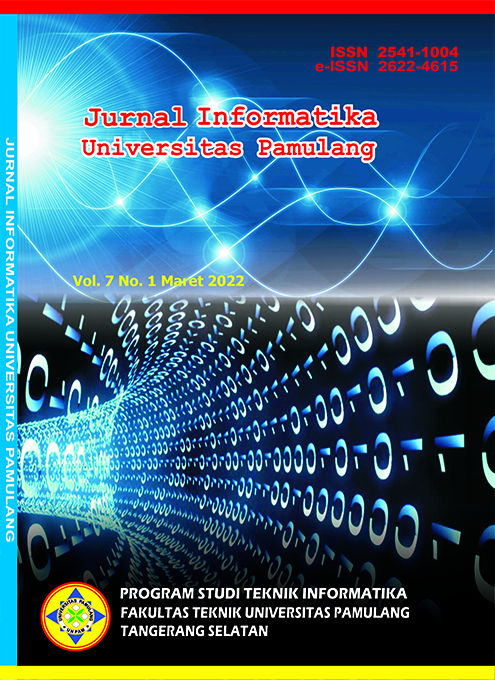Pengujian Black Box ada Aplikasi Hitung Nilai Mahasiswa Menggunakan Metode Equivalence Partitions
DOI:
https://doi.org/10.32493/informatika.v7i1.16224Keywords:
Aplication, Black box, Testing, Quality, SoftwareAbstract
Black-box testing is very influential in finding flaws and errors in the software because it can identify errors in functions, interfaces, data models, and access to external information sources. During the testing process, the problem often arises that the tester is never sure that the software being tested has met the criteria for being eligible for testing. This condition occurs because sometimes there are still some execution paths that have never been tested. The examiner should be able to make every possible mix of input information for the test material. The selection of input information to detect errors is a problem for testers because it has a high gap, so that an automatic test trial model can be a solution to automatically generate a test trial model in software testing. The black-box method with the identical division technique requires a false awareness technique.References
Ahrizal, D., Miftah, M. K., Kurniawan, R., Zaelani, T., & Yulianti, Y. (2020). Pengujian Perangkat Lunak Sistem Informasi Peminjaman PlayStation dengan Teknik Boundary Value Analysis Menggunakan Metode Black Box Testing. Jurnal Informatika Universitas Pamulang, 5(1), 73-77. doi:10.32493/informatika.v5i1.4338
Cholifah, W. N., Yulianingsih, Y., & Sagita, S. M. (2018). Pengujian Black Box Testing pada Aplikasi Action & Strategy Berbasis Android dengan Teknologi Phonegap. STRING (Satuan Tulisan Riset dan Inovasi Teknologi), 3(2), 206-210. doi:10.30998/string.v3i2.3048
Hidayat, H. T. (2017). Pengujian kualitas kelayakan perangkat lunak dengan penerapan perancangan model Rapid Aplication Development. Elinvo (Electronics, Informatics, and Vocational Education), 2(2), 121-129. doi:10.21831/elinvo.v2i2.17304
Hidayat, T., & Muttaqin, M. (2018). Pengujian Sistem Informasi Pendaftaran dan Pembayaran Wisuda Online menggunakan Black Box Testing dengan Metode Equivalence Partitioning dan Boundary Value Analysis. Jutis (Jurnal Teknik Informatika), 6(1), 25-29. doi:10.33592/jutis.Vol6.Iss1.38
Ijudin, A., & Saifudin, A. (2020). Pengujian Black Box pada Aplikasi Berita Online dengan Menggunakan Metode Boundary Value Analysis. Jurnal Informatika Universitas Pamulang, 5(1), 8-12. doi:10.32493/informatika.v5i1.3717
Maulana, A., Kurniawan, A., Keumala, W., Sukma, V. R., & Saifudin, A. (2020). Pengujian Black Box pada Aplikasi Penjualan Berbasis Web Menggunakan Metode Equivalents Partitions (Studi Kasus: PT Arap Store). Jurnal Teknologi Sistem Informasi dan Aplikasi, 3(1), 50-56. doi:10.32493/jtsi.v3i1.4307
Muslimin, D. B., Kusmanto, D., Amilia, K. F., Ariffin, M. S., Mardiana, S., & Yulianti, Y. (2020). Pengujian Black Box pada Aplikasi Sistem Informasi Akademik Menggunakan Teknik Equivalence Partitioning. Jurnal Informatika Universitas Pamulang, 5(1), 19-25. doi:10.32493/informatika.v5i1.3778
Ningrum, F. C., Suherman, D., Aryanti, S., Prasetya, H. A., & Saifudin, A. (2019). Pengujian Black Box pada Aplikasi Sistem Seleksi Sales Terbaik Menggunakan Teknik Equivalence Partitions. Jurnal Informatika Universitas Pamulang, 4(4), 125-130.
Nugraha, B. F., Aditama, F., Arrofi, M., Ahmad, S. U., & Yulianti, Y. (2020). Pengujian Black Box pada Aplikasi Penghitungan Parkir Swalayan ADA Menggunakan Teknik Equivalence Partitions. Jurnal Informatika Universitas Pamulang, 5(2), 146-151. doi:10.32493/informatika.v5i2.5350
Shaleh, I. A., Prayogi, J., Pirdaus, P., Syawal, R., & Saifudin, A. (2021). Pengujian Black Box pada Sistem Informasi Penjualan Buku Berbasis Web dengan Teknik Equivalent Partitions. Jurnal Teknologi Sistem Informasi dan Aplikasi, 4(1), 38-45. doi:10.32493/jtsi.v4i1.8960
Sinulingga, A. R., Zuhri, M., Mukti, R. B., Ziasyifa, & Saifudin, A. (2020). Pengujian Black box pada sistem aplikasi informasi data kinerja menggunakan teknik Equivalence Partitions, 2.
Susanto, J., Biqirrosyad, B., Junaidi, M. M., Sudrajat, Y., & Desyani, T. (2021). Pengujian Black Box pada Aplikasi Desktop Penjualan Elektronik Menggunakan Metode Equivalence Partitioning. Jurnal Teknologi Sistem Informasi dan Aplikasi, 4(1), 38-45. doi:10.32493/jtsi.v4i1.8960
Downloads
Published
Issue
Section
License
Authors who publish with this journal agree to the following terms:
- Authors retain copyright and grant the journal right of first publication with the work simultaneously licensed under a Creative Commons Attribution-NonCommercial 4.0 International (CC BY-NC 4.0) that allows others to share the work with an acknowledgement of the work's authorship and initial publication in this journal.
- Authors are able to enter into separate, additional contractual arrangements for the non-exclusive distribution of the journal's published version of the work (e.g., post it to an institutional repository or publish it in a book), with an acknowledgement of its initial publication in this journal.
- Authors are permitted and encouraged to post their work online (e.g., in institutional repositories or on their website) prior to and during the submission process, as it can lead to productive exchanges, as well as earlier and greater citation of published work (See The Effect of Open Access).
Jurnal Informatika Universitas Pamulang have CC-BY-NC or an equivalent license as the optimal license for the publication, distribution, use, and reuse of scholarly work.
In developing strategy and setting priorities, Jurnal Informatika Universitas Pamulang recognize that free access is better than priced access, libre access is better than free access, and libre under CC-BY-NC or the equivalent is better than libre under more restrictive open licenses. We should achieve what we can when we can. We should not delay achieving free in order to achieve libre, and we should not stop with free when we can achieve libre.
Jurnal Informatika Universitas Pamulang is licensed under a Creative Commons Attribution-NonCommercial 4.0 International (CC BY-NC 4.0)
YOU ARE FREE TO:
- Share : copy and redistribute the material in any medium or format
- Adapt : remix, transform, and build upon the material for any purpose, even commercially.
- The licensor cannot revoke these freedoms as long as you follow the license terms





